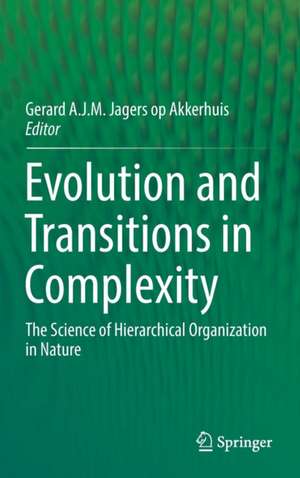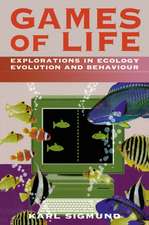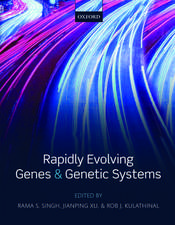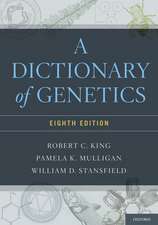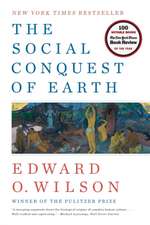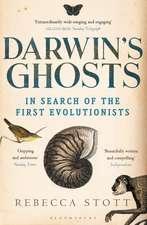Evolution and Transitions in Complexity: The Science of Hierarchical Organization in Nature
Editat de Gerard A.J.M Jagers op Akkerhuisen Limba Engleză Hardback – 27 oct 2016
This work puts forth a new point of view which allows researchers to define in detail the concept of evolution. To create this conceptual definition, the text applies a stringent object-based focus. With this focus, the editor has been able to develop an object-based pattern of evolution at the smallest scale. Subsequently, this smallest scale pattern is used as an innovative basis for generalizations. These generalizations create links between biological Darwinism and generalized Darwinism. The object-based approach that was used to suggest innovations in the field of Darwinian evolution also allowed for contributions to other topics, such as major evolutionary transitions theory, the definition of life and the relationships between evolution, self-organization and thermodynamics.
Together, the chapters of this book and the multidisciplinary reflections and comments of various specialists on these chapters offer an exciting palette of innovative ideas.
| Toate formatele și edițiile | Preț | Express |
|---|---|---|
| Paperback (1) | 641.20 lei 43-57 zile | |
| Springer International Publishing – 28 iun 2018 | 641.20 lei 43-57 zile | |
| Hardback (1) | 647.40 lei 43-57 zile | |
| Springer International Publishing – 27 oct 2016 | 647.40 lei 43-57 zile |
Preț: 647.40 lei
Preț vechi: 761.65 lei
-15% Nou
Puncte Express: 971
Preț estimativ în valută:
123.92€ • 134.65$ • 104.16£
123.92€ • 134.65$ • 104.16£
Carte tipărită la comandă
Livrare economică 21 aprilie-05 mai
Preluare comenzi: 021 569.72.76
Specificații
ISBN-13: 9783319438016
ISBN-10: 3319438018
Pagini: 242
Ilustrații: XII, 295 p. 28 illus., 3 illus. in color.
Dimensiuni: 155 x 235 x 25 mm
Greutate: 0.61 kg
Ediția:1st ed. 2016
Editura: Springer International Publishing
Colecția Springer
Locul publicării:Cham, Switzerland
ISBN-10: 3319438018
Pagini: 242
Ilustrații: XII, 295 p. 28 illus., 3 illus. in color.
Dimensiuni: 155 x 235 x 25 mm
Greutate: 0.61 kg
Ediția:1st ed. 2016
Editura: Springer International Publishing
Colecția Springer
Locul publicării:Cham, Switzerland
Cuprins
1. General Introduction. Part 1: The Operator Theory and Its Applications.- 2. Introducing the Operator Theory.- 3. Reflections on the Operator Theory.- 4. Darwinian Evolution: Process or Pattern? 5. Reflections on the Graph Representation of Darwinian Evolution.- 6. Generalising Darwinian Evolution by Using Its Smallest-Scale Representation as a Foundation.- 7. Critical Assessment Of Graph-Based Generalized Darwinism.- 8. The Role of Structural Criteria in Transitions Theory: A Focus on Organisms.- 9. In Defence of Gradualism.- 10. The Role of Structural Criteria in Transitions Theory: A Focus on Systems of Interacting Organisms.- 11. Major transitions, Operator Theory, and Human organization.- 12. Learning From Water: Two Complementary Definitions of the Concept of Life.- 13. Adding (Thermo)Dynamic Aspects to Definitions of Life.- 14. A Thermodynamic Account of the Emergence of Organised Matter.- 15. The Road to a Measurable Quantitative Understanding of Self-organization andEvolution.- Part 2:Discussion, Reflections, and Conclusions.- 16. General Discussion.- 17. What Comes Next? The Operator Theory as an Operationalisation of the Teilhardian View on Cosmogenesis.- 18. In Response to the Reflections of the Reviewers.- 19. Contributions to Open Challenges in Systems Theory and the Life Sciences.
Notă biografică
Gerard Jagers op Akkerhuis is driven by a passion for evolution and complexity, he studies the past, present and the future of the universe. Fundamental for his approach is a modern, scientific version of the classical Scala Naturae named the Operator Hierarchy. This hierarchy offers a mechanistic basis for the classification of objects in the world, connects biotic and abiotic evolution, and by extrapolation suggests future system kinds in evolution. Since 2013 Gerard has been involved in the artificial intelligence company ‘Mind|Construct’.
Gerard obtained his Masters in Wageningen (1986, cum laude), received his first PhD in Ecotoxicology (Wageningen, 1993) and, seventeen years later, his second PhD in philosophy (Nijmegen, 2010). Gerard has (co-)authored over a hundred publications and has published two books: ‘The operator hierarchy’ and ‘The pursuit of complexity’. He has been interviewed by a national newspaper in the series about “Controversial thinkers whose ideas can change our view of the world”.
Gerard obtained his Masters in Wageningen (1986, cum laude), received his first PhD in Ecotoxicology (Wageningen, 1993) and, seventeen years later, his second PhD in philosophy (Nijmegen, 2010). Gerard has (co-)authored over a hundred publications and has published two books: ‘The operator hierarchy’ and ‘The pursuit of complexity’. He has been interviewed by a national newspaper in the series about “Controversial thinkers whose ideas can change our view of the world”.
Textul de pe ultima copertă
This book discusses several recent theoretic advancements in interdisciplinary and transdisciplinary integration in the field of evolution. While exploring novel views, the text maintains a close link with one of the most broadly held views on evolution, namely that of “Darwinian evolution”.
This work puts forth a new point of view which allows researchers to define in detail the concept of evolution. To create this conceptual definition, the text applies a stringent object-based focus. With this focus, the editors have been able to develop an object-based pattern of evolution at the smallest scale. Subsequently, this smallest scale pattern is used as an innovative basis for generalizations. These generalizations create links between biological Darwinism, and generalized Darwinism. The object based approach that was used to suggest innovations in the field of Darwinian evolution also allowed for contributions to other topics, such as major evolutionary transitions theory, the definition of life and the relationships between evolution, self-organization and thermodynamics.
Together, the chapters of this book and the multidisciplinary reflections and comments of various specialists on these chapters, offer an exciting palette of innovative ideas.
This work puts forth a new point of view which allows researchers to define in detail the concept of evolution. To create this conceptual definition, the text applies a stringent object-based focus. With this focus, the editors have been able to develop an object-based pattern of evolution at the smallest scale. Subsequently, this smallest scale pattern is used as an innovative basis for generalizations. These generalizations create links between biological Darwinism, and generalized Darwinism. The object based approach that was used to suggest innovations in the field of Darwinian evolution also allowed for contributions to other topics, such as major evolutionary transitions theory, the definition of life and the relationships between evolution, self-organization and thermodynamics.
Together, the chapters of this book and the multidisciplinary reflections and comments of various specialists on these chapters, offer an exciting palette of innovative ideas.
Caracteristici
Introduces ideas about life, Darwinian evolution and major transitions that have not been published before Provides a novel object-based perspective on several conventional evolutionary approaches Puts forth a logically coherent philosophical framework for thinking about the concept of Darwinian evolution and transitions in complexity Explains links between the emergence of complex organization and thermodynamics Includes reviews of the author’s theories from a wide variety of contributors Includes supplementary material: sn.pub/extras
